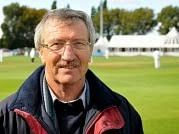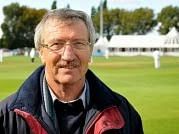
An interview with Alan Hill: Part 6

Who was the best batsman you saw?
Oh.. Garfield Sobers. He was unbelievable and just had so much time. He allowed the ball to come on to him, which made that time but was a fantastic player. If he played now he’d be a multi-millionaire, as he had it all. He bowled pretty quick left arm, or could slow down and swing it; he bowled orthodox left-arm spin and could switch to bowl chinamen; he was a terrific fielder…he was genuinely the complete cricketer and would probably have been a decent wicket-keeper too!
At any one discipline he was outstanding, but he was a top-drawer performer in them all. A remarkable, extraordinary cricketer.
Majid Khan was a fine player too and a character. I remember him coming to Derby one time and being surprisingly scratchy when he batted. When he was out, he asked for the groundsman and requested a saw. Keep in mind that this was a time when you had to pay for your equipment, and we all sat incredulous, watching him saw this bat in half. All the time muttering “This bat is a piece of ****”
I’d have loved to have seen Walter Hammond at Gloucestershire. He carried them for years and scored thousands of runs at a time when the game had evolved sufficiently for his scores and records to be taken seriously. He played pace and spin with equal ability and must have been a remarkable player.
He once told his team mates that Tom Goddard, who took thousands of wickets for them with his off-spin, hadn’t bowled especially well in a game and that it was just poor batting that got him wickets. He proceeded to go out and bat against him in a turning net, using just the edge of his bat – and Goddard didn’t get past him once.
That takes a serious eye and major talent…
Who was the best batsman you played with? I assume either John Wright or Peter Kirsten?
They were top lads. I didn’t see it, as I wasn’t playing, but John made 96 against the West Indians at Chesterfield when they had a strong pace attack and a fast track to bowl on. David Steele said it was the best innings he ever saw, which was quite an accolade, but it illustrates what I mean about good players. Wrighty got bigger scores, but against lesser attacks and in more favourable conditions. That one would have been special for him.
I saw John last winter in New Zealand, after going to see some Ashes cricket. He’s still doing well and looking good. Peter was a more fluent player, but there were plenty who thought that on all pitches and against all attacks, John maybe had the edge.
He used to lead sing-songs on buses and play his guitar – he had a kind of residency at a local pub called the Woodlark for a while. He makes a lot of money now as coach to the Mumbai Indians but he is exactly the same.
Kirsy was a good lad too, a top cricketer. He was a brilliant fielder and on his day he was unstoppable. David Steele used to call him ‘The Don’, which is a pretty good accolade.
A couple of bowlers of real talent retired prematurely in your era. Alan Ward and Fred Swarbrook. How was that from the playing perspective?
It was a shame. Fred was a really good cricketer and a really gritty player. I once saw Mike Procter give him a really tough time when he came out as night watchman. He was peppering him with really fast, short deliveries into his body, but Fred stood his ground and he didn’t get him out.
He was a fine bowler. He was taking a good number of wickets for Derbyshire every season and then came back one year and simply couldn’t pitch the ball. It was a great shame for Fred as it brought about the end of his first class career.
He’s still living and coaching in South Africa at a highly reputable college in Port Elizabeth and Fred was a super lad.
Alan I also saw last winter and he is living on the Gold Coast in Australia with his wife, Helen. It’s a lovely part of the world to live! He met her when he toured with England in 1970 and although they moved to this country, I think they went back to Australia around ten years ago.
It was a great shame what happened to him. He was one of the fastest bowlers in the country, possibly the world at one point. Certainly Majid Khan reckoned that he was, and he was a good judge. When I saw him at 18 he was a fantastic sight, like Concorde taking off. He had this long approach, with his body leaning forward, then he would arch back and unleash this missile at the batsman.
But he wasn’t a confident guy and used to get really nervous before he bowled. Can you imagine, bowling at that pace at batsmen who themselves were nervous at facing his thunderbolts? It was a shame that he didn’t have that self-confidence, because he was seriously quick.
Who were the characters of your era? Always involved in funny incidents?
Well, I’ve mentioned Mike Page and Colin Tunnicliffe was a great personality. He would come in every day with a smile on his face and there were always jokes and stories flying around the dressing room.
The camaraderie of that time is something that I remember fondly and Colin and I remain good friends after all these years. He’s a lovely lad. It’s the great thing about the game and I always tell young players that if they play it the right way they will get so much from it.
Things were said on the field – it’s a man’s game after all – but we didn’t get hugely personal and you gave it and took it in equal measure. It was competitive stuff and you had to be prepared for it.
I was batting against Yorkshire at Chesterfield once and their opening bowler, the late Tony Nicholson, stood halfway down the wicket, arms akimbo, as he stared at me, having beaten my outside edge once more without success. He shook his head and said “I tell thee what Hilly. If tha were battin’ on my front lawn, Ah’d draw the bloody curtains…” Now that is proper, funny, humorous sledging!
You became a first-class umpire on retirement but only for a couple of seasons. Why was that?
I wasn’t decisive enough. It didn’t work out for me and I will admit that. My talents were better suited to coaching and the pressure of umpiring is considerable, especially now, with instant replays and referrals.
Did getting sacked by Derbyshire as a coach change your opinion of the club?
No. It changed my opinion of some of those involved, but this is and always will be my club. I’m down at the ground regularly and if I can’t get here I follow the scores closely. It’s given me some heartache over the years, but it’s given me many wonderful memories too.
As a coach, what is the X Factor that separates a very good club cricketer from one capable of the next step?
Desire. Once your ability has got to a certain level, you will get opportunity at second eleven, or first team level. Then you need to work at your game and be prepared to keep doing so. You can always learn something and as soon as you think you have cracked it, that’s generally when the game will come back to bite you.
If you are prepared to do the hard graft and have the requisite talent, you can make it. But you can’t do it without both of those attributes.
And what of the youngsters. Who has impressed you?
There’s a good few lads have come through the Staffordshire system that I am involved with, players like Alex Hughes, Ben Cotton, Tom Taylor..they have worked hard to get to this stage in their careers and they now need to step it up to make the next level.
I’m always wary of making predictions, because a lot of things can go wrong, but if they maintain the desire and keep listening to the right people and working on their games, they have every chance of success.